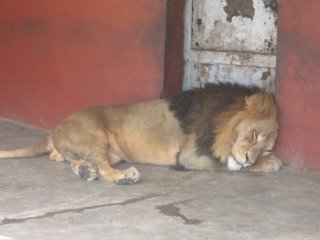
I am confused…
Can someone please explain to me why the most recent stories picked up by the Associated Press (though admittedly occasionally including stories of dictators past)have been mainly about football scandals, athletic achievements and endangered species? Granted, Ethiopia may not rank among the most influential or closely- observed nations in the West, but between the new developments surrounding the ongoing political trial and…umm…THE WAR, one would assume that now (if ever) a foreign correspondent stationed in this country could manage to pitch a story or two!
Don’t get me wrong, I am most certainly an animal lover (and proud PETA contributor) myself but I must admit that I have a far more difficult time sympathizing with lions in a place where people are being murdered and oppressed on a daily basis…I simply fail to recognize how this story could take priority over the other—the ever-growing volume of crimes against humanity—being written simultaneously in this country…?!
Nonetheless (fearing that this place has already made me more callous than I care to admit) I decided to go down to the “Ambasa Gibee” and assess the plight of the rare Abyssinian lions (and, if I am to be completely honest, the competence of the AP reporter!) for myself.
Upon arrival, the smell alone suggested that the conditions of captivity were far worse than those I have encountered in any other zoo throughout my world travels. In concrete enclosures hardly larger than my living room, I found these magnificent creatures lying listlessly next to trails of urine on bare concrete floors. Though Abyssian lions are a naturally small species, it remained blatantly obvious that these pairs were slowly starving to death--coats that had lost all sheen, stretched tightly over jutting rib bones could hardly disguise their measured journey towards death.
Originally established by Emperor Haile Sellassie in 1940 as a personal collection,impressive entourage and source of pride, this compound under EPRDF ownership has fallen into unacceptable disarray (little wonder from a government who makes it a habit to publicly discard life and liberty). The grounds, though lovingly tended year-round by a handful of employees, are pitiful--offering only a few wilted flower beds and apologetic shrubs. By way of concession, a small stand offers donuts and beverages which can be consumed at leisure (under the hot sun), while next door is a privately-owned children’s playground, whose admissions reportedly partially subsidizes zoo maintenance/animal care (which the government is “unable to solely assume”, thus the starving lions).
What this care consists of, exactly, is hard to determine and I arrived intentionally at noon to witness the daily feeding of the lions. Curious as to the nature of their meals, I watched as the lions sprang to life nearly half an hour before the designated feeding time, with terrible, awe-inspiring purpose—pacing frantically back and forth in frenzied anticipation, saliva dripping from their powerful jaws. When it seemed they would finally tear through the bars of the cage and devour us all, a worker tossed them a meager chunk of meat and bone (no larger than my head), amidst the applause of the crowd who had gathered to watch the daily spectacle. (One lion actually significantly bent the bars of cage to bring the meal inside the cage—testament to the sheer power of starvation, I suppose.)
One worker explained that though she has been employed by the zoo for many years, she wished the government would close down operations—even if it meant she losing her only job—simply to “end the suffering of the animals”. She confided with a motherly concern that the lions were not able to run because of the narrow confines of their enclosures and how their paws were often and easily torn, made soft from pacing the unnaturally smooth concrete floor). She told of how the legs of the cubs (removed from their mothers far too early) often become temporarily paralyzed because the concrete floor in their tiny enclosure is too cold at night; together we sadly shook our heads as we observed them lying amidst their own feces--destined for decades in miserable captivity or the dubious ‘mercy’ of the taxidermists (as reported by AP correspondent Les Nehaus. When questioned, zoo officials of course had “never heard of such allegations”, though I find myself more inclined to side with this report and my new found employee-friend...)
So, despite my somewhat ignoble intentions, I guess I discovered something important in visiting the lions that day: Life is life and suffering is suffering. Even though this country has opened my eyes to so much, I still cannot bear to witness even a lion in such shameful conditions.
I suppose, if this is the way this government chooses to honor the ‘King of the Jungle’ it should come as no surprise that they would seek to also imprison the true political leaders and national heroes of this country in similar fashion. Though such comparison is unfortunately far closer to reality than poetic indulgence, it seems that the international community can more easily respond to ‘animal cruelty’ than the gross, ongoing human rights violations occurring here.
(So, don’t worry about it, Les—we understand, and we’ll take it from here!)

1 comment:
This is just really sad. Remember growing up in Addis, my dad used to take us there to see the lions. I think there were cheetahs also. Sometimes I am not surprised; at least those lions get a meal once a day. There are millions of Ethiopians who can even get one meal a day. What I am wondering is why not privatize the zoo if the government can not manage it properly? This is really sad, sad..
Post a Comment